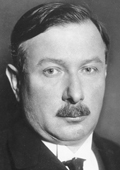 |
Joseph Karl Wirth
b. 6 Sep 1879, Freiburg im Breisgau, German Reich
d. 3 Jan 1956, Freiburg, West Germany |
| Title: |
Reichskanzler (Reich Chancellor) |
| Term: |
10 May 1921 - 22 Nov 1922 |
| Chronology: |
10 May 1921,
appointed, order issued by the Reich President on 10 May 1921 [1] |
| |
22 Oct 1921, resignation submitted to the Reich President, accepted pending the appointment of a successor [2] |
| |
26 Oct 1921,
appointed, order issued by the Reich President on 26 Oct 1921 [3] |
| |
14 Nov 1922, resignation submitted to the Reich President, accepted pending the appointment of a successor [4] |
| |
22 Nov 1922,
discharged, order issued by the Reich President on 22 Nov 1922 [5] |
| Biography: |
| Attended public school in Freiburg; studied mathematics, economics and natural sciences in the University of Freiburg; earned doctor's degree (1905); worked as professor in Realgymnasium in Freiburg (1908-1913); was elected to municipal council (1911); elected to the second chamber of the Ständeversammlung of the Grand-Duchy of Baden (1913-1918); member of the Reichstag (1914-1918); joined the Red Cross as a volunteer during World War I; forced by illness to return to parliamentary activities, he supported peace initiatives and was made finance minister in the Provisional Government of Baden (10 Nov 1918 - 1 Apr 1919); elected to the National Constituent Assembly (Verfassunggebende Nationalversammlung); served as finance minister of the Free State of Baden (1 Apr 1919 - 14 Aug 1920); joined the Reich governments of Hermann Müller and Konstantin Fehrenbach as finance minister (27 Mar 1920 - 10 May 1921); appointed Reich Chancellor (10 May 1921 - 22 Nov 1922) and formed a coalition government composed of the German Centre Party (Deutsche Zentrumspartei, commonly known as Zentrum), Social Democrats (Socialdemokratische Partei Deutschlands) and Democrats (Deutsche Demokratische Partei); held the post of finance minister (10 May 1921 - 26 Oct 1921) and also served as acting foreign minister (10 May 1921 - 23 May 1921); the policy of governments was targeted at fulfillment of Germany's obligations under the Versailles Treaty, but on 22 Oct 1921 he and his cabinet resigned in protest against the division of Upper Silesia in favour of Poland; was asked to form a new government; served as acting foreign minister (26 Oct 1921 - 31 Jan 1922) until Walther Rathenau was appointed to the post; signed the Treaty of Rapallo (1922) with Russia; after the murder of Rathenau by right extremists (24 Jun 1922), assumed the management of foreign ministry (25 Jun 1922); insisted on adoption of the Law on Defense of the Republic (1922); failing to achieve consensus over the reparation issues, resigned as Reich Chancellor (14 Nov 1922); broke with the parliamentary group of the Centre Party in the Reichstag (1925) due to growing differences with the party's leadership; served as minister for the occupied territories (13 Apr 1929 - 30 Mar 1930) in the second government of Hermann Müller and as interior minister (30 Mar 1930 - 9 Oct 1931) in the cabinet of Heinrich Brüning; the installation of Nazi regime forced him to emigrate; returned to Germany in 1948 and settled in Freiburg; founded a Christian social workers' party "Union der Mitte" (1948); participated in numerous peace conferences and condemned the creation of Bundeswehr and Germany's membership in NATO. |
| Biographical sources: "Joseph Wirth", by Ulrike Hörster-Philipps (Paderborn: Schöningh, 1998); Reichstags-Handbuch. I. Wahlperiode. 1920. Berlin: 1920. S. 356; Reichstags-Handbuch. II. Wahlperiode. 1924. Berlin: 1924. S. 553; Reichstags-Handbuch. III. Wahlperiode. 1924. Berlin: 1925. S. 394; Reichstags-Handbuch. IV. Wahlperiode. 1928. Berlin: 1928. S. 467-468; Reichstags-Handbuch. V. Wahlperiode. 1930. Berlin: 1930. S. 515; Reichstags-Handbuch. VI. Wahlperiode. 1932. Berlin: 1932. S. 260-261; Reichstags-Handbuch. VII. Wahlperiode. 1932. Berlin: 1933. S. 449; Reichstags-Handbuch. VIII. Wahlperiode. 1933. Berlin: 1933. S. 305. |
| |
| [1] |
Bundesarchiv, R 43 I/3632, fl. 4. |
| [2] |
Akten der Reichskanzlei: Weimarer Republik. Die Kabinette Wirth I und II (Boppard am Rhein: Boldt, 1973), Band 1, S. 340-341: "Nr. 120 Der Reichskanzler an den Reichspräsidenten. 22. Oktober 1921 R 43 I/1304, Bl. 262 Abschrift <...> {Footnote} An den Abdruck dieses Demissionsschreibens schließt in der DAZ folgende Information an: „An die Überreichung der Demission schloß sich eine längere Aussprache über die politische Lage an, in deren Verlauf der Reichspräsident den Reichskanzler ersuchte, mit den übrigen Reichsministern die Geschäfte zunächst weiterzuführen. Damit erklärte sich der Reichskanzler einverstanden. – Der Reichspräsident wird heute vormittag den Präsidenten des Reichstages und die Vorsitzenden der Reichstagsfraktionen der bisherigen Koalitionsparteien zu Einzelbesprechungen empfangen.“ (DAZ Nr. 489 vom 23.10.21)." DAZ = Deutsche Allgemeine Zeitung. |
| [3] |
The date of confirmation of Wirth and his Cabinet in their offices can be presumed from the letter of Reich President Ebert of 25 Oct 1921 and the proceedings of the Cabinet meeting of 26 Oct 1921. Cf. Akten der Reichskanzlei, op. cit., Band 1, S. 343-344. |
| [4] |
Akten der Reichskanzlei, op. cit., Band 2, S.1170: "Fortsetzung der Kabinettssitzung vom 14.11.1922, 22 Uhr <...> Der Reichskanzler erwiderte, daß es nicht üblich sei, den Rücktritt des Kabinetts mit Vorwürfen zu verbinden. Er stellte dann fest, daß ein Widerspruch gegen die Demission des Kabinetts nicht erhoben werde und daß er demgemäß sofort dem Herrn Reichspräsidenten die Demission des Gesamtkabinetts überreichen werde. Der Herr Reichskanzler begab sich dann zu dem Herrn Reichspräsidenten." |
| [5] |
Bundesarchiv, R 43 I/3632, fl. 177. |

